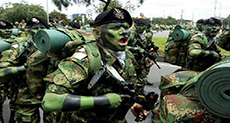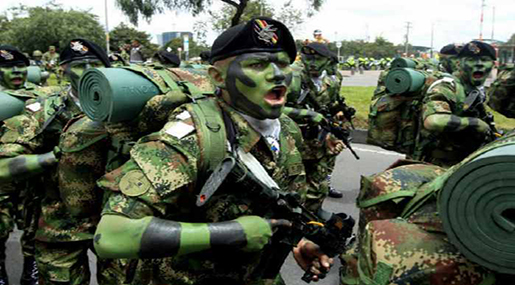UAE Recruits More Colombian Mercenaries to Fight in Yemen

Local Editor
The United Arab Emirates secretly sent some 300 Colombian mercenaries to fight for it in Yemen, paying handsomely to recruit a private army of well-trained, battle-hardened South American soldiers, sources said.

The sources, who spoke on condition of anonymity, said the Colombians' experience fighting leftist guerrillas and drug traffickers in their home country made them attractive recruits for the UAE, whose relatively inexperienced army is part of a Saudi led coalition waging war on Yemen.
"Colombian soldiers are highly prized for their training in fighting guerrillas," one source, a Colombian former army officer, said in Bogota.
"Colombians have so many years of experience in war that they can take it."
The source, a 48-year-old man who left the army in the late 1990s, was himself formerly employed by Blackwater, the controversial US company now known as Academi that was contracted by the Pentagon to provide military and security services in Iraq.
He was hired in 2004, amid what he called a "boom in the recruitment of Colombians to fight in Iraq," and has since worked in Afghanistan, the UAE, Qatar and Djibouti.
Latin Americans were popular with firms like Blackwater, he said: in all, 1,500 Colombians, 1,000 Peruvians, 500 Chileans and 250 Salvadorans were contracted in Iraq between 2004 and 2006.
He said that from around 2010 the UAE began recruiting Colombians for a private army it was forming at a base in the middle of the desert called Zayed Military City.
Prized as special forces commanders or Blackhawk helicopter pilots, the Colombians are paid around $3,300 a month -- five times less than equivalent American contractors, but a small fortune by Colombian standards, he said.
Their deployment came after 30 Emirati soldiers were killed in Yemen in a missile attack by the Yemeni Army and revolutionary forces.
The source said the UAE initially planned to send 800 Colombians but met resistance from the recruits, who complained that fighting in Yemen was beyond the scope of their original contracts.
"The Colombians were supposed to pass unnoticed as local Emirati troops, and that caused a large number of them to desert," the source said. "They said their contract was in the UAE and not fighting other people's wars."
He said the UAE sought to sweeten the deal by limiting tours of duty to three months and offering an extra $120 a day in combat pay.
"They want to make war an industry using Colombians as cannon fodder," he said.
Another Colombian source, security expert John Marulanda, said lucrative salary offers from foreign firms are a "drain" on Colombia's well-trained but poorly paid military.
"Around 2011, very well-trained people started leaving," Marulanda told AFP.
"The UAE is participating in the coalition by discreetly sending mercenaries to Yemen. And it is a fact that among those mercenaries there are former members of the Colombian military."
A retired senior Colombian officer who asked not to be named said this had "created quite a lot of problems" for the Colombian defense ministry.
"The best officers are going" to the Emirates, the retired officer added. "They are not recruiting their own nationals. They prefer to recruit people who are already prepared and specialized."
Source: News Agencies, Edited by website team
Comments




